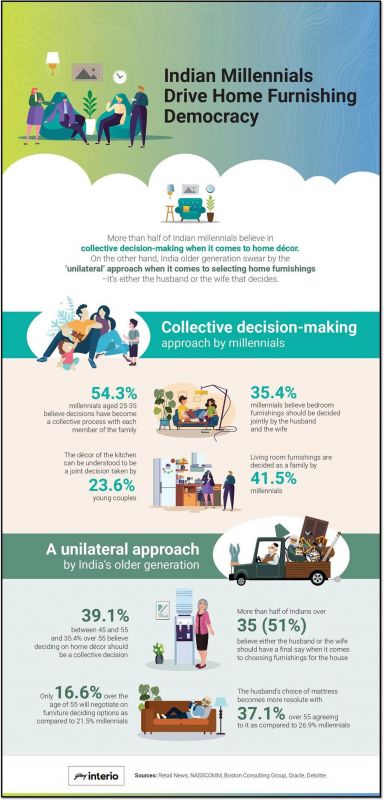Millennial couples become torchbearers to spur societal transformation
The Interio Index is a light-hearted survey designed to understand the decision-making process behind Indians' choice of home furnishings.

Peter Braganza, a wiry gray haired waiter serving guests in one of South Mumbai’s upmarket restaurants since last three decades knows all the regular customers and also the signature dishes on offer. Three decades ago, Peter would approach the senior most looking male member seated at the table with one menu card and the order would be placed without discussion with other seated family members.
However, these days Peter approaches tables with two or three menu cards and every family member, especially one’s with millennial couples jointly look at the offerings and discuss. Thereafter, the family orders after taking each members inputs thereby making the decision making process more inclusive. This isn’t merely about the class or strata of society but rapid transformation happening across the entire larger community, wherein millennial couples are playing the pivotal role.
There is largely a feeling that Indian society has improved vis-à-vis earlier generations wherein our parents or grandparents were decisions makers. However, we need to chalk out the yardstick or benchmark for societal improvement. Does enhanced education levels, better lifestyle and upgraded infrastructural amenities mean improvement in Indian society?

A large proportion of Indian families would dine at restaurants once a month earlier since income levels were lower. Most Indian families today dine at restaurants much more frequently and such outings are no longer considered a luxury. This trend definitely reveals lifestyle transformation for the better.
I feel that the real benchmark for societal improvement has been the enhanced participation of women in the decision making process. For example, today the millennial couple takes joint decisions wherein both spouses – the husband and wife discuss each other’s preferences while ordering food at restaurants. As per the Interio Index, when it comes to home furnishings, 54.3% millennials, aged between 25 and 35, believe home furnishing decision is a truly collective process, with each member of the family having a say. Joint decision making process is truly a sign of societal improvement since the family is the smallest but most vital indicator of any society’s health. And improvement is more about perspective wherein both spouses take decisions jointly irrespective of their gender.
Thriving societies are those wherein maximum number of empowered families resides and all members, especially women are treated on an equal footing. Such families and societies enjoy happier lifestyles vis-à-vis their counterparts both in terms of materialistic benefits and overall contentment.
We increasingly find today millennial couples taking various decisions such as purchasing daily groceries, selecting the type of home interiors to the colours that need to cover the walls. In addition, there are many instances of such millennial couples walking into top-notch furnishing showrooms and thereby jointly taking purchase decisions while keeping each other’s likes and taste in mind. The Interio index study reveals that 47.6% of respondents aged between 35 and 45 consider home décor a collective decision. In the age group of 45-55, 39% of respondents, and 35.4% in the age group of 55+ recognised home décor as a collective decision.
Such millennial couples don’t merely take joint decisions pertaining to consumer goods such as televisions and refrigerators but also on a host of other issues. The irony was that in many instances earlier, certain consumer goods such as washing machines, refrigerators and microwaves were mainly utilised by wives or women but the decisions making was done by the husband. Such scenario has become rare today with men equally sharing the responsibility of household chores and involving wives in every facet of the decision making process.
In fact, many financial decisions such as long term investment and insurance planning is also taken up jointly by today’s millennial couples. Such joint decision making helps since both partners can sit together and calmly ponder about their life’s long term priorities. It is also the best option since the financial decisions taken will affect not one but both partners in the long term.
Another reason for this transformation in the decision making process could be enhanced educational levels amongst millennial couples. An increasing number of millennial couples are travelling abroad and becoming aware about the openness and inclusivity of Western societies, especially in the decision.
The authored article is written by Mr Anil Mathur, Chief Operating Officer , Godrej Interio.

